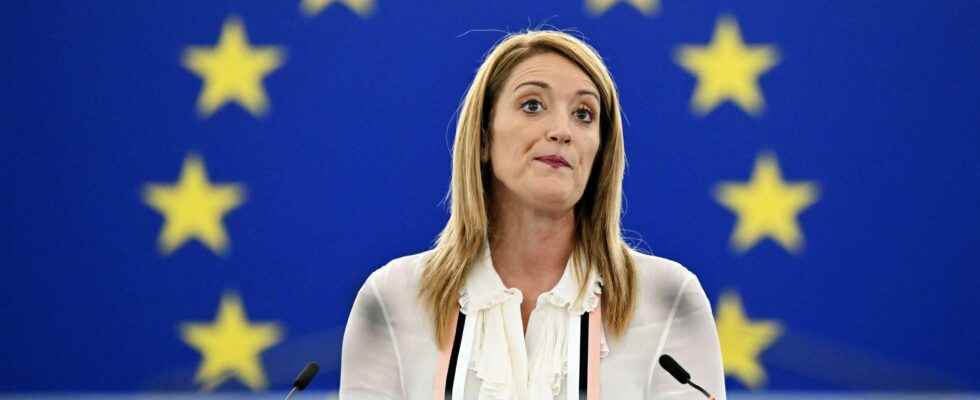“Our parliament is under attack, European democracy is under attack. Malicious actors, linked to autocratic third countries, have tried to instrumentalize NGOs, trade unions, aides and members of parliament to influence our processes.” By opening the plenary session in Strasbourg on Monday evening December 12, the President of the European Parliament, the Maltese Roberta Metsola, did not minimize the seriousness of the corruption scandal which has shaken the institution representing 450 million European citizens since Friday. The European Parliament is in turmoil. Two reactions that fell on Monday, December 12 alone summarize the risks that Qatargate poses to its reputation. To begin with, the Hungarian Prime Minister, engaged in a standoff over the rule of law with the European institutions, is openly rubbing his hands. “Hello European Parliament”, quips Viktor Orban in person on the social network twitter, above a photo of hilarious men reacting to the phrase ‘The European Parliament is seriously concerned about corruption in Hungary’. A few minutes later, the MEP Pascal Canfin tries to remind that the assembly must still take important decisions this week. “While parliamentarians allow themselves to be shamefully corrupted, others are working for our future”, pleads the president of the Environment Committee, in charge of several important pieces of legislation of the European Green Pact, such as the unprecedented carbon tax at the borders.
However, it is difficult to make this message audible beyond the media fracas and the political shock wave triggered by the imprisonment of the Greek vice-president of the institution. Socialist Eva Kaili has been sleeping in a cell since December 9, accused of corruption and money laundering. According to the revelations of the Belgian daily Le Soir, more than 150,000 euros in cash were found in handbags and luxury travel bags at her home. His father was also arrested when he was hastily fleeing a Brussels hotel with a cabin suitcase full of small bills… In the crosshairs of the Belgian justice are also a parliamentary assistant, companion of Ms. an influential former social-democrat MEP, the Italian Pier Antoni. All would have been corrupted by Qatar, according to the Belgian press.
“It is tempting for elected officials to refuse to work in the public eye”
“We must isolate these bad apples and punish them quickly, believes Christine Verger, European Parliament expert at the Jacques Delors Institute. Even if the institution as such is not corrupt, it is an attack on its reputation. “. Since Friday, calls for more ethics in the European Parliament have multiplied. The political groups compete with proposals. The Macronists of the Renaissance group are calling for an independent High Authority, on the model of the French High Authority for the transparency of public life. For her part, Manon Aubry, elected representative of France Insoumise, is asking, among other things, for a review of the access of former elected representatives to the buildings of the European Parliament. “We can always try to improve deterrence and transparency, but there will always be people for whom a bag of money will be worth the risk”, nevertheless warns President Metsola.
Parliament must quickly manage the damage to images if it does not want to come out of the affair permanently weakened. Since Friday, the reluctance of MEPs to accept a control of their activities is bad. “Parliament gives moral lessons to the whole world, it must apply demanding rules,” said a Brussels lobbyist. In the past, MEPs have for example refused to make their appointments public, whereas it is compulsory for European Commissioners. “It is tempting for elected officials to refuse to work in the public eye, because it would make their job more difficult,” explains Michiel van Hulten, director of Transparency International EU. the opportunity to make the necessary changes, so as not to pay the price of immobility in the next elections”. By starting the plenary session in a heavy atmosphere, the President of Parliament announced the opening of an internal investigation. She promised reforms to better establish in the future who has access – or not – to parliamentarians. At the same time, the Belgian federal prosecutor’s office announced new searches, including one at the institution’s Brussels headquarters.
